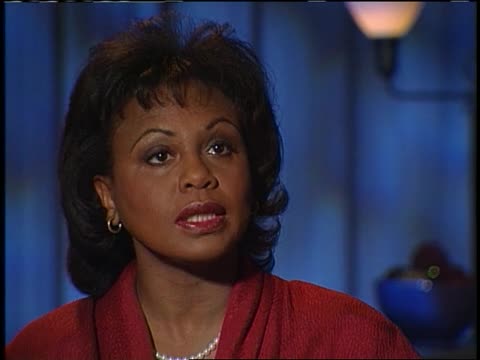Basic Black; 3205; Conversation With Anita Hill
- Series
- Basic Black
- Episode Number
- 3205
- Episode
- Conversation With Anita Hill
- Producing Organization
- WGBH Educational Foundation
- Contributing Organization
- WGBH (Boston, Massachusetts)
- AAPB ID
- cpb-aacip-15-36txc2d4
If you have more information about this item than what is given here, or if you have concerns about this record, we want to know! Contact us, indicating the AAPB ID (cpb-aacip-15-36txc2d4).
- Description
- Episode Description
- Anita Hill became a familiar face in the media in 1991, when she testified during the Senate confirmation hearings for then-Supreme Court nominee Clarence Thomas. Hill accused Thomas, her former supervisor at the Department of Education and Equal Employment Opportunity Commission, of sexual harassment. Now a professor at Brandeis University, Hill talks to Basic Black host Darren Duarte about her views on law and the long-term effects the hearings have had both on her and the country. The February 6th broadcast of this program is particularly timely, as February 5 marks the release date of David Brock's Blinded by the Right: The Conscience of an Ex-Conservative. In 1993 Brock first wrote The Real Anita Hill: The Untold Story, a book aimed at discrediting Hill. In Blinded by the Right, Brock admits that this earlier book consisted largely of false and unconfirmed information. In her conversation with Duarte, Hill acknowledges her struggle to remain true to her own principles, regardless of the public scrutiny she received. "Sometimes the maintenance of power relies on myths and lies," says Hill, "and the big lie that I think was exposed throughout the hearings was about our experience, women's experience, in the workplace--the lie that sexual harassment is not a reality, that sexual harassment is something that has been fabricated by women who are spurned or have ulterior motives." Hill, who received a law degree from Yale University, explains that her interest in law was inspired early on by Civil Rights activists such as Patricia Harris. "Growing up during the Civil Rights movement, one of the things I recognized was that a lot of the women who were involved in the Civil Rights movement were lawyers. It was the first time that I actually saw African American women in professional positions." "In 1991, I had been out of law school for 11 years, I had been teaching law and I had really learned to understand it and to believe in the integrity of the law," says Hill. "I had learned to understand that if the law meant anything or was to mean anything, not only did the law itself have to have integrity, but so did the courts." Following the hearings, Thomas attained a position on the Supreme Court, and Hill became a target of harsh criticism by many, including David Brock in The Real Anita Hill. In response, Hill decided to tell her own story, writing the book Speaking Truth to Power. "I wanted people to understand that I was a full human being," says Hill. "When I came into the hearing, nobody knew anything about me, and you had just this little snapshot of me that got manipulated or distorted depending on who was presenting the snapshot." Although Hill had to face the harsh realities of sudden notoriety following the hearings, she was also able to observe some positive results of her efforts. In the years following the hearings, the number of reports of sexual harassment cases increased dramatically, and significantly more women began running for public office. Hill acknowledges that these important changes stem from the fact that her testimony was not only relevant to herself and her specific work experiences, but transcended into the collective experience of working women. "The issues that were raised in the hearing were issues that were affecting the lives of women everyday in the workplace," she concludes. Hill explains that her belief in the value and power of law motivated her to participate in the hearings regarding Clarence Thomas' appointment to the Supreme Court.
- Description
- No description available
- Media type
- Moving Image
- Duration
- 00:31:04;08
- Credits
-
-
Producing Organization: WGBH Educational Foundation
- AAPB Contributor Holdings
-
WGBH
Identifier: cpb-aacip-2b854371d6b (Filename)
Format: Betacam
Generation: Master
Duration: 00:28:35
If you have a copy of this asset and would like us to add it to our catalog, please contact us.
- Citations
- Chicago: “Basic Black; 3205; Conversation With Anita Hill,” WGBH, American Archive of Public Broadcasting (GBH and the Library of Congress), Boston, MA and Washington, DC, accessed April 26, 2025, http://americanarchive.org/catalog/cpb-aacip-15-36txc2d4.
- MLA: “Basic Black; 3205; Conversation With Anita Hill.” WGBH, American Archive of Public Broadcasting (GBH and the Library of Congress), Boston, MA and Washington, DC. Web. April 26, 2025. <http://americanarchive.org/catalog/cpb-aacip-15-36txc2d4>.
- APA: Basic Black; 3205; Conversation With Anita Hill. Boston, MA: WGBH, American Archive of Public Broadcasting (GBH and the Library of Congress), Boston, MA and Washington, DC. Retrieved from http://americanarchive.org/catalog/cpb-aacip-15-36txc2d4
